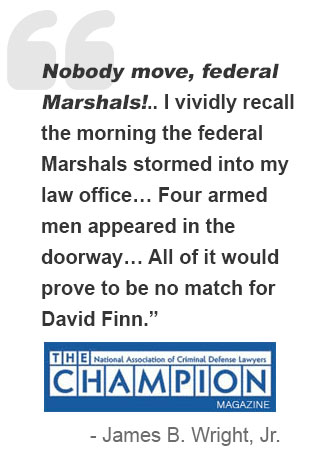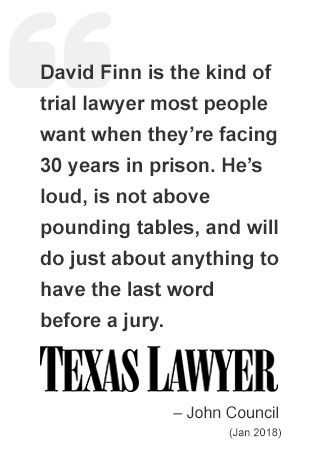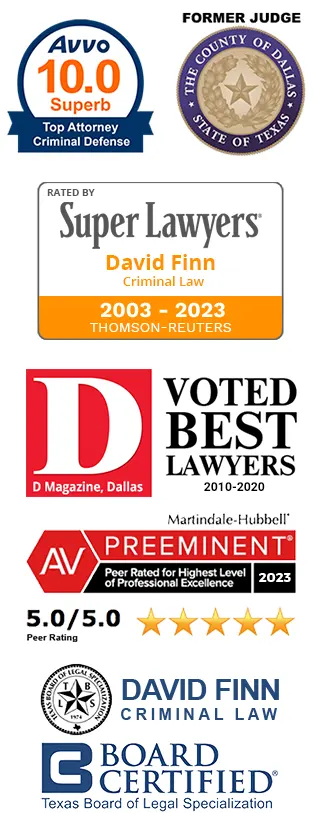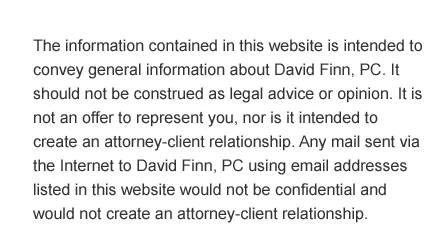


Dallas DA Shootout: Texas Lawyer
Six Pack: Great Race, More Thrilling
By John Council
Texas Lawyer
Monday, January 9, 2006
Never mind the governor’s race. One of the most interesting campaigns in Texas for 2006 is for Dallas County district attorney.
Over the past 54 years, only three men have held the Dallas County DA position — Henry Wade, John Vance and Bill Hill. Two-term DA Hill’s Nov. 11, 2005, announcement that he would not seek re-election set off a scramble to claim the job.
Dallas County, long a Republican stronghold, is showing signs that it’s warming up to Democratic candidates; in the 2004 election cycle, Democrats picked up three state district court judgeships and the sheriff’s job.
As of Jan. 2, the Texas secretary of state’s deadline to file for a political office, six lawyers — three Republicans and three Democrats — had announced their intentions to seek the Dallas County DA post.
A crowded race is to be expected when there’s an opening for the political post once held by Wade, one of Texas’ most famous prosecutors, says Cal Jillson, a political science professor at Southern Methodist University.
“That always makes it a free-for-all,” Jillson says. “DAs, unless they do something that draws adverse public attention, they get re-elected. It’s not uncommon for DAs to serve for a decade or more.”
“But when they give up their seats, there is a feeding frenzy by both Democrats and Republicans,” Jillson says. “And here what you have is a very close balance between the Democrat and Republican Parties. Both sides believe that they can win.”
Both sides are fielding an interesting lineup of candidates with various strengths and weaknesses. Who’ll come out on top? It’s anybody’s guess, four political observers say.
Republicans
Hill didn’t do his party any favors with his surprise announcement that he would not seek re-election. Not only did the move prevent the Republican Party from solidifying its support behind a single strong candidate to succeed Hill, it also kept GOP candidates from months of critical fundraising.
But a GOP official doesn’t see Hill’s late 2005 announcement as a hindrance to the overall goal of the party — to make sure a Republican replaces Hill.
“Bill really did a good job of telling us his intentions. . . . [O]bviously not as early as would have been expected, but enough time to get three quality candidates,” says Cody Hand, political director for the Dallas County Republican Party.
Days after Hill’s decision, Judge Vickers “Vic” Cunningham was the first to announce his candidacy for DA. Cunningham stepped down from Dallas’ 283rd District Court bench and started lining up support from Republican leadership for his DA bid.
“I’ve always wanted to run for DA. That’s always been a part of my career path,” says Cunningham, who served as a Dallas County assistant district attorney for six years, a county court judge for six years and a felony court judge for five years.
Being the first to announce, having stood for election previously and having parents with deep roots in Dallas County Republican politics all give him an edge, Cunningham says.
“This is a Republican primary. And the important part of being in the corner office is you’ve got to have the experience to manage the party politics [and] the office, that simply being the prosecutor in court doesn’t provide all of those experiences for you,” Cunningham says.
In November 2005, as Cunningham charged ahead with his campaign, Dan Hagood, a criminal-defense lawyer and partner in Dallas’ Fitzpatrick, Hagood, Smith & Uhl, announced he might seek the DA post. But he stepped aside weeks later, when his close friend, Toby Shook, announced his candidacy.
Shook, felony bureau chief, has served in the Dallas County DA’s office for 22 years, and has a reputation as one of Texas’ best prosecutors. Shook has handled some of the office’s biggest cases, including prosecuting members of the so-called “Texas Seven,” a group of escaped convicts who killed an Irving police officer in 2000. Cunningham was the judge who presided over the trials of the Texas Seven, all of whom were convicted and sentenced to death.
After speaking with Hagood and being dissatisfied with the qualifications of some of the other lawyers and judges considering a run, Shook says he jumped in.
“I felt that we had to keep a strong DA in Dallas,” Shook says. “And at that point I felt I had no choice but to run.”
Hill has endorsed Shook.
Although he’s a political novice who has never run a campaign, and Cunningham has a head start, Shook says he is making headway.
“I’ve had a good response, from grassroots Republicans to the business community,” Shook says. “And the law enforcement response has been outstanding.”
Shook is more than just a trial lawyer and is not to be underestimated, says Hagood, Shook’s campaign treasurer.
“Toby’s like an iceberg; you see the tip in trial. But I can’t tell you how many people come to Toby for advice. He’s a trial lawyer who leads by example,” Hagood says. “That, really to me, is the essence of leadership.”
The third Republican vying to become the next Dallas County DA is Judge Dan Wyde, who stepped down from the Dallas County Criminal Court No. 3 bench last month to run for the job.
Wyde previously served as a Dallas County assistant district attorney for seven years, before he resigned in 1997. (Wyde was subsequently appointed to the county bench. [See “Departed ADA Now Sitting as Judge,” Texas Lawyer, June 30, 1997, page 1.]
Wyde says he was lining up support to run for the post even before Hill decided not to seek re-election.
“I’m running for district attorney, because I believe I can have the greatest impact in lowering Dallas’ embarrassingly high crime rate,” Wyde says. “We’re going to do that by prioritizing the cases that are prosecuted. And we’re going to speed up the prosecution process.”
Dallas County Commissioner Kenneth Mayfield, who led Wyde’s DA exploratory committee, thinks Wyde has enough support to compete against Shook and Cunningham.
“I think it’s very likely that that race will be a runoff,” Mayfield says. “And I think it’s very likely that Dan will make the runoff.”
But David Finn, a criminal-defense attorney and partner in Dallas’ Milner & Finn, believes the Republican primary will boil down to a tight race between Cunningham and Shook.
“The job is largely administrative [and] that caters to Vic’s skill-set,” says Finn, who ran an unsuccessful campaign for DA as a Republican in 2002. “But Toby is a fighter, and he’s the guy you want to have your back at the beaches of Normandy or prosecuting someone who’s injured or harmed one of your loved ones.”
Finn believes early voting will play a large role in the March GOP primary.
“If they can build up a 5 to 10 percent advantage in early voting and break even on [the Republican primary] election day, they’ll win,” Finn says.
Democrats
After coming within 10,000 votes of winning the DA’s office in 2002 and taking the sheriff’s office in 2004, Democrats think this is their year to win the top prosecutor’s post.
In 2004, voters elected Democrat Lupe Valdez as Dallas County sheriff. Valdez’s victory received national press coverage, because she is a gay Hispanic Democrat who won in a county that had long been considered a Republican stronghold.
“It shocked everyone, and it made it viable for Democrats to run for office,” says Darlene Ewing, chairwoman of the Dallas County Democratic Party.
“From our standpoint, we’ve always thought that Bill Hill was vulnerable,” Ewing says. “And we think that the Republicans in general are vulnerable.”
In 2002, a criminal-defense solo named Craig Watkins came close to toppling Hill in the November general election. Now Watkins, who also owns a title company and a bail bond business, is again running for DA. Watkins served as an intern in the Tarrant County District Attorney’s Office for eight months, worked as an assistant Dallas city attorney for one year and as an assistant Dallas County public defender for three years before entering private practice.
Watkins says his experience in the private sector running his own businesses makes him the best candidate for the job.
“The difference [between 2002 and 2006] is, as a result of my run last time, I have the support of the Dallas County Democratic officials,” Watkins says, including state Sen. Royce West and Dallas County Commissioner John Wiley Price, both of whom are influential politicians in South Dallas.
Watkins believes that South Dallas voters, where his law office is located, will be key to the primary election.
“Traditionally most of the support for the county-wide offices have gone through North Dallas,” Watkins says. “But that has changed.”
He cites 2005 municipal elections, including the defeat of two different proposals that would have given the Dallas mayor more power, as being determined by South Dallas voters.
Larry Jarrett, an assistant U.S. attorney in Dallas for nearly 14 years who resigned from his job in May 2005 to run for DA, says he has the best resume. He is the only Democrat running for district attorney who has significant felony trial experience.
“I have 20 years in the Marine Corps. I’ve led teams of prosecutors. And I also have community experience. I was in charge of the community relations division at the U.S. Attorney’s Office,” Jarrett says. “I think those are qualities that anyone would want in a district attorney’s office.”
But Jarrett must battle questions over whether he is a real Democrat. Jarrett says he voted in Republican primaries during the 1990s because there was a dearth of Democrats running for county offices at the time.
B.D. Howard, a criminal-defense solo who has practiced for 30 years, hopes his longtime South Dallas practice and ties to the area will give him the advantage in the Democratic primary.
Howard believes Watkins’ close run in 2002 was really the result of straight-ticket Democratic voters drawn to the polls to vote for popular former Dallas Mayor Ron Kirk, who lost his Democratic U.S. Senate bid.
Howard believes Jarrett’s prosecutorial experience is not an advantage, either.
“You don’t need prosecutorial experience. You need someone from the outside,” Howard says. “People want a change and a different way of prosecuting crime in Dallas County.”
Howard thinks he can win the primary through his support in South Dallas and other parts of the county. And he thinks he’s the best man to face a Republican in November.
“If we’re going to win this race, I’m going to have to be at the top of the ticket,” Howard says.
Adam Seidel, a family law and criminal-defense solo who’s a member of the Stonewall Democrats of Dallas, believes the primary vote will split between Watkins and Jarrett. While Jarrett may have more support from the legal community, Watkins has already made inroads with the core Democratic voters in the county, Seidel says.
“I think that Watkins has a good experience of drumming up support outside the courthouse, and Jarrett is going to have to catch up,” Seidel says.
Come November, Finn predicts a photo finish in the DA’s race.
“I think it’s probably going to be Vic and Watkins in a shootout,” Finn says. As for the winner of that match-up, Finn says, “Flip a coin.”
Phone Numbers
Office: (214) 538-6629







